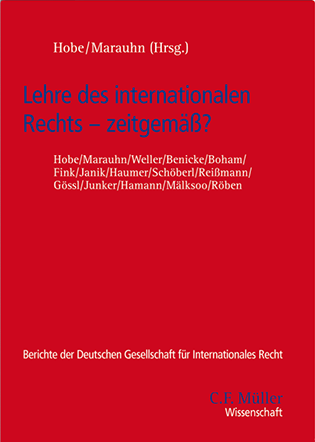The German Society of International Law is committed to ensuring that the internationalization of law and the associated changes in the demands placed on lawyers are adequately reflected in undergraduate studies in law. Following the work of a study commission on "International Law in Legal Education" in the 1970s, the working group legal education again devoted itself intensively to the topic between 2011 and 2017 and took a number of initiatives.
The working group, led by Stephan Hobe and Thilo Marauhn, conducted a quantitative survey of legal education in international law in the German-speaking world and also dealt with timely content and formats of teaching. Based on the results of the working group, the DGIR made appeals to those responsible in the judiciary, in politics and in law faculties in Germany, Austria and Switzerland.
legal education
Nowadays, lawyers have to meet not only national and european, but also global requirements in all areas of law. This has changed the demands placed on young lawyers, who are expected almost everywhere to be able to navigate a system of law ranging from national to european to international and transnational law.
The German Society of International Law strives to ensure that the internationalisation of the law and the associated changes in the demands placed on lawyers are adequately reflected in undergraduate studies in law.
The aim is not to impart detailed knowledge of international law or private international law, but to provide an introduction on the influence of international and foreign law on domestic law. This also includes rudimentary methdological knowledge and skills for mastering the practical legal challenges associated with the growing body of internationally relevant norms.
Against this background and based on the report of the working group legal education, the DGIR adopted the following resolution at its 35th Biennial Conference in Berlin (2017):
Resolution of the Council of the German Society for International Law
Nowadays, lawyers no longer face only national, but also european, global and transnational challenges. Legal education at universities must adequately respond to these challenges.
Therefore, the German Society of International Law calls upon all those responsible in Germany to work towards ensuring
that the basic elements of public international law, private international law and comparative law become part of undergraduate studies in law.
that the current weight of 'areas of specialisation' in German legal education is maintained.
that private international law remains or becomes subject of the „Erste Juristische Prüfung“ (First State Examination in Law).
demands
special workshop of the working group
On 16 March 2016, Stephan Hobe and Thilo Marauhn (as chairs of the working group legal education) organised a workshop in Cologne, dedicated to the question 'Legal education in international law - up-to-date?' ('Lehre des internationalen Rechts - zeitgemäß?").
The contributions established and evaluated the state of legal education in international law in an international comparison and discussed timely teaching contents and innovative teaching formats. On the basis of these contributions, a resolution was adopted in which the German Society of International Law called upon all those responsible in the German-speaking world
to work towards esnuring that the basic elements of public international law, private international law and comparative law become part of the undergraduate studies in law. As part of their specialisation, students should also have the opportunity to study international law in foreign languages and in an interactive format.
Following the workshop, the contributions were published as Issue 48 of the German Society of International Law's conference proceedings.
stocktaking
The initial task of the working group legal education was to conduct a quantitative assessment of the legal education in international law by surveying law faculties in Germany, Austria and Switzerland.
One of the main findings of this assessment is that most of the international legal education in Germany takes places in the 'areas of specialisation'. Typically, only European law is taught to a relevant extent at the undergraduate level. As a consequence, only a small percentage of graduates are more than minimally qualified in international law. In addition, private international law and public international law clearly take a bakc seat to European law in the areas of specialisation, comparative law almost entirely disappears at the level of elective courses. In Austria, due to the stronger anchoring of international legal education in undergraduate studies, there is a broader distribution of the respective shares in the curriculum. In Switzerland, at least public international law is more strongly represented at the undergraduate level.
Detailed results of the quantitative survey can be found in the short article "Grundausbildung im Internationalen Recht" (in German) by Stephan Hobe, Thilo Marauhn and Georg Nolte for the Juristenzeitung as well as in this presentation (in German) by Stephan Hobe and Thilo Marauhn.
